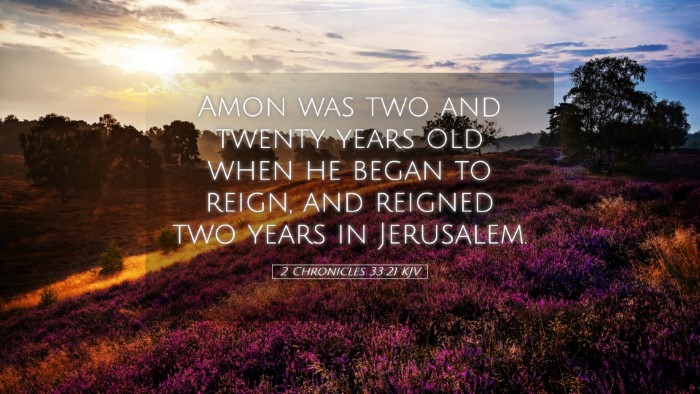Commentary on 2 Chronicles 33:21
Verse Context: 2 Chronicles 33:21 states: “Ammon was two and twenty years old when he began to reign, and reigned two years in Jerusalem.” This verse follows the account of King Manasseh, Ammon's father, whose reign was notable for idolatry and an eventual return to true worship. Understanding Ammon's short reign and the context surrounding it is essential for grasping the implications of leadership and the faithfulness of God’s covenant promises.
Summary of Insights
1. Leadership and Responsibility
Matthew Henry emphasizes that the age of Ammon when he ascended the throne indicates a period ripe for instruction yet vulnerable to the influences around him. His youth did not excuse the poor choices he made; rather, it highlights the importance of godly mentorship. Leaders must be rooted in the truth to guide others effectively.
2. The Nature of His Reign
Albert Barnes points out that Ammon continued in the sinful ways of his father Manasseh before his repentance. This perpetuation of ungodliness resulted in further spiritual decline in Judah. Ammon’s reign serves as a warning about the consequences of rejecting God’s laws and the importance of repentance.
3. Implications for Israel’s Spiritual State
Adam Clarke notes that Ammon's short reign reflects the instability within the kingdom. The nation stood divided between the following of God and the traditions of idolatry. This duality illustrates the pressing need for authentic leaders who seek the Lord rather than those who merely follow the ways of their predecessors.
Reflection on Regnal Patterns
-
Continuity of Sin: The text implies a continuation of Manasseh's policies, suggesting that children are often influenced by the actions of their parents. This serves as a grave reminder for parents to exemplify Godliness.
-
Short Reigns and Consequences: The brevity of Ammon’s reign (two years) prompts consideration about the effectiveness and moral standing of leaders. His administration was marked by instability and rebellion, raising questions on how leadership impacts national faith.
-
The Urgency of Repentance: Even within a reigning period overshadowed by sin, the legacy of Manasseh is one of redemption. When leaders respond to God, as Manasseh eventually did, they fashioned a path forward for their subjects to seek God earnestly. This became vital through Ammon's reign.
Lessons for Today’s Leaders
Moral Integrity: Leaders today are called to exhibit integrity and not simply perpetuate patterns from their predecessors. Ammon exemplifies what happens when a leader fails to act in accordance with God’s commands.
Mentorship and Influence: The necessity of mentorship in faith-based leadership cannot be overstated. The negative influence of Ammon is a clarion call for current leaders to invest in the spiritual formation of their successors.
Short-term Consequences: The outcomes of leadership decisions may sometimes reflect in the short-term, as seen with Ammon. This speaks to the urgency of making godly choices that have lasting impacts on communities and nations.
Theological Implications
Theological interpretation of 2 Chronicles 33:21 encourages believers to reflect on God’s sovereignty even when witnessing ungodly leadership. While Ammon’s reign was tragic, it showcases God's overarching control and plan for His people, as He later raised reformative leaders in Judah.
Conclusion
In summary, 2 Chronicles 33:21 serves as a reminder of the influence of leaders on the community’s spiritual journey. The brief reign of Ammon invites pastoral reflection on mentorship, the importance of godly living, and the peril of influences that threaten to detach leaders and their followers from the covenant established by God. Ultimately, it is a call to fidelity to God's Word, urging leaders to cultivate a heart of repentance and guide their communities towards divine obedience.


